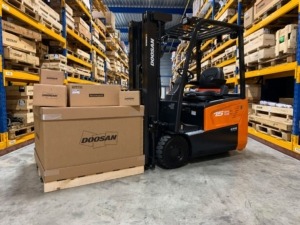Lithium Forklift or Lead Acid Forklift – Which Comes Top?
Electric forklift trucks have been a presence in many operations for years. However, they are becoming increasingly popular due to their lower maintenance, increased efficiency and eco-friendliness. You can choose between a lithium or lead acid forklift. Here we go through the differences between each battery type.

What Is a Lead Acid Battery?
Lead-acid batteries are the traditional batteries for electric forklifts. They generate electricity through a chemical reaction, this reaction is then reversed when being charged.
How Do Lithium-ion Batteries Work?
Lithium-ion batteries are charged and discharged by lithium ions moving between the negative and positive electrodes. They are able to store more energy compared to their lead-acid equivalent. As lithium forklifts become increasingly popular, the many advantages over traditional forklifts are becoming clear.
Which Comes Top – Lithium-Ion or Lead Acid?
There are many ways that lithium-ion can be compared with lead acid, however, the most important differences between the two battery types.
Energy Density: Compared to lead-acid, lithium-ion forklift batteries have a higher energy density. As a result, lithium batteries have the capacity to store more energy in a more compact and lightweight way, enabling longer running durations and higher efficiency.
Charging Time: Fast charging is a huge benefit of lithium-ion batteries, when charging they can reach 80% of their capacity as little as one hour. In comparison, lead-acid batteries need to be charged for a longer period of time—typically 8 to 12 hours or more, in order to regenerate the cells of the battery.
Opportunity Charging: Lithium-ion trucks can be opportunity charged, which enables quick and flexible recharging during short breaks between shifts. This optimises productivity and saves time on switching batteries and water top-ups, which is necessary with lead-acid batteries.
Lifespan: Lithium forklift batteries typically last three to four times longer than lead-acid batteries. This longer lifespan does vary based on usage and maintenance. This longer lifespan reduces the frequency of battery replacements and overall costs in the long run.
Continue reading to find out more about the differences between lithium and lead acid forklifts.
If you would like to find out more about what Dawsongroup material handling can offer or about the Smarter Asset Strategy, then get in touch today.
For a Smarter Asset Strategy that provides sustainable business solutions, request a free consultation with a Dawsongroup expert by completing the contact form below.
UK Head office
Delaware Drive
Tongwell
Milton Keynes
MK15 8JH

Dawsongroup Limited | Company reg. no. 01902154 (registered in England and Wales)